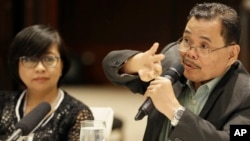This week an international investigation determined that both the Philippine government and Muslim rebels broke a cease-fire agreement after a botched police raid in a rural southern town left 65 people dead. Peace negotiators from both sides say they respect the findings and are forging ahead with the peace process.
In a summary that the government’s peace panel released, the International Monitoring Team (IMT) found the police commandos violated terms of the ceasefire when they entered rebel turf in January without first coordinating with the military, police in the area and two joint bodies that monitor for possible conflict and help take civilians out of harm’s way. The team also found several other ceasefire violations on the part of the police Special Action Force.
The IMT also found that Muslim rebel fighters broke the truce when they entered the battleground and engaged the commandos after they were fired at.
The police raiders were after two internationally suspected terrorists in Mamasapano town, a known rebel area, when they clashed with Muslim rebel factions. The day-long fight left 44 commandos, 17 Moro Islamic Liberation Front (MILF) fighters and four civilians dead.
The monitoring body also recommended that the rebel fighters and police commandos involved who were found to have committed crimes should face the country’s penalties for crimes against international humanitarian law.
MILF Chief Peace Negotiator Mohagher Iqbal said the rebel group respected the findings and recommendations and was so far “happy with the report.”
The January 25 incident sowed distrust on both sides and put in doubt passage of a proposed Bangsamoro Basic Law (BBL) that would help create an autonomous region in the Muslim-majority south.
Lawmakers have raised questions about the proposal’s constitutionality, questioning some aspects based on what happened during the raid. Now the peace negotiators are pushing hard to clarify what they call misinformation that has been circulating.
Iqbal said the measure had a 50-50 chance of passing. “But we are working very hard; the government especially, the MILF, the civil society organizations and everybody is working very much. So I think there is a great chance of passing the BBL,” he said.
Iqbal said negotiators were reaching out to the international community, business groups, Catholics and Protestants, the military and other organizations to muster support for the passage of the law.
He said the proposal had to remain intact because a “watered down version” would not keep with the agreements that were signed over the past 17 years, which addressed the rebels’ aspiration for self-determination.
Government peace panel Chair Miriam Coronel-Ferrer said getting the law passed was a “shared responsibility” for the country.
“It requires everybody to be onboard and to do their part. In the case of the legislature, that’s their role, to pass the law. And that is the risk that the MILF has taken, to enter this legislative arena and to engage Congress in order for them to legislate the law that would create the Bangsamoro political entity, because there’s no other way,” she said.
Negotiators are hoping the measure will pass both houses of Congress in June, which would give enough time for an October referendum in the area affected where residents can choose whether they want to be part of the new entity.
A transitional authority would then oversee setting up a parliament in the new region, which would be filled after national elections in May 2016.




